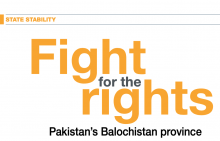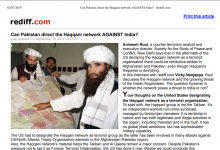-

With the change in the political guard in Pakistan following the May 11 general election, apprehensions have grown in India regarding the strategy of the newly-crowned government of Prime Minister Nawaz Sharif to fight Kashmir-centric militant groups, especially the Lashkar-e-Taiba (LeT) and its various incarnations.
-

Bangladesh, the world’s fourth largest Muslim country, has recently experienced an intense cycle of massive protest rallies marked by violent confrontations between moderate secularists and Islamic radical forces. The spark for these religious and political confrontations has been the ongoing trials for war-crimes committed by Islamist groups during and just after 1971’s Operation Searchlight, the Pakistani campaign that preceded the Bangladesh Liberation War.
-

The acceptance of feasibility of BRICS Development Bank at recently concluded Fifth BRICS Summit at Durban has sent a shivering effect on a certain section who criticise the very idea.
-

"Since Islam was introduced in the Maldives in the 12th century, religious practices in the country have been moderate. Yet in the past decade, the country has grown increasingly religiously conservative. This became especially evident following the implementation of political reforms and the transition to multiparty democracy in 2008, which gave a greater voice to religious conservatives and those calling for the rigid implementation of Shari`a (Islamic law) in the Maldives.[8]
-

Since the beginning of the New Year, fears of a dangerous border conflict have returned to haunt India and Pakistan as a spate of ceasefire violations and terrorist incursions continue to take place at the Line of Control (LoC) border between Indian and Pakistani-held Kashmir.
-

-

The BioWeapons Monitor 2012 contains country reports on BWC-relevant activities in eight states: Brazil, Germany, India, Japan, Kenya, Switzerland, the United Kingdom, and the United States. In-country authors collected and analysed relevant information that is distributed through this publication. The authors used open sources and actively sought information from government departments, research institutions, industry, scientific societies and other entities.
-

The problems facing the troubled province of Balochistan are complex and diverse. The author (Animesh Roul) examines the challenges, including the conflict between the province's nationalists and the state, that illustrate Pakistan's struggle for control of the region.
Key points
-

The security situation in the Jammu & Kashmir (J&K) state of India has reached a new low in the past few months as militant organizations backed by Islamabad have stepped up a campaign of politically-motivated violence by targeting vital infrastructure in the region and attacking civil society members. The region’s status remains disputed by Pakistan, which refers to J&K as “Indian-occupied Kashmir.” In what seems to be a shift in terrorist tactics, the militants have begun focusing on soft targets such as workers, engineers and village-level political representatives.
-

Animesh Roul, a counterterrorism analyst and executive director, Society for the Study of Peace and Conflict, New Delhi says that in the aftermath of the US declaring the Haqqani network as a terrorist organisation there could be retributive strikes in Afghanistan and Pakistan, even though Haqqani's firepower is dwindling.
In this interview with rediff.com Vicky Nanjappa, Roul discusses the Haqqani network and the growing threat of the Indian Mujahideen. The question, however, is whether the network poses a threat to India or not?
Paxton ported to drupal by DropThemes.in